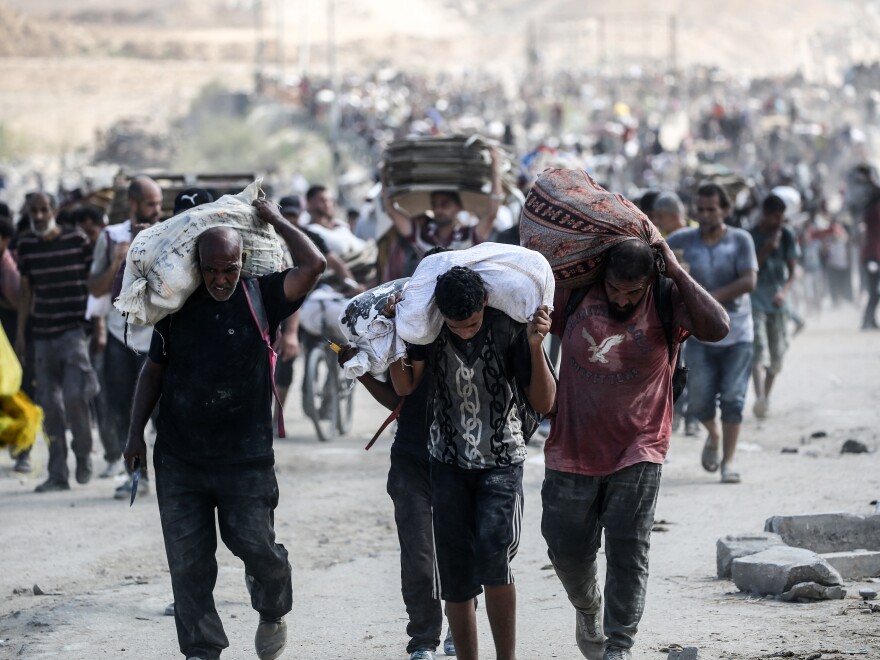Updated @ 8:54 AM EDT on August 3, 2025
According to the Gaza Health Ministry, Israeli forces killed at least 325 individuals in Gaza last week when they were attempting to reach food. That number includes 24 people who were killed on Saturday across the territory, according to morgues and health officials contacted by NPR.
Health officials and municipal morgues also reported that 14 individuals were killed on Sunday.
Despite Israeli promises of a humanitarian respite in attacks to let more aid to enter, the deadly food quest continues as famine engulfs Gaza and deaths from malnutrition rise.
When contacted for comment, Israel’s military claims that its forces had only fired warning shots in a few of these situations, such as Wednesday’s killing of over 90 relief workers who were attempting to remove grain sacks off trucks as they rolled into Gaza close to a military base on the border.
Israel’s aid limits have been denounced globally. According to U.N.-backed hunger specialists, a famine is currently raging in Gaza.
Last weekend, Israel started permitting more trucks and air shipments of aid from other nations into Gaza, but humanitarian organizations believe this is still insufficient. According to the U.N. World Food Program, armed gangs and ravenous crowds have stolen almost all of the food from trucks before it can be delivered to warehouses.
President Trump sent two U.S. officials to Gaza on Friday with Israeli troops in response to the crisis. While there, they witnessed a food distribution station maintained by the Gaza Humanitarian Foundation (GHF), which is supervised by Israel and possesses millions of U.S. dollars.
Prior to Israel seizing complete control of Gaza’s border with Egypt, where a substantial portion of the aid had arrived, United Nations organizations had securely provided aid during a ceasefire earlier this year and were mainly able to do so even during the first six months of the conflict.
Israel claims that the purpose of its aid limitations is to put pressure on Hamas and keep its fighters from profiting from it. U.N. agencies and international relief organizations have referred to the restrictions as collective punishment and claim that armed gangs, some of whom Israel has publicly supported in an effort to weaken Hamas, are stealing their aid.
Fallout from U.S. envoy’s visit
Following his visit to the location with Steve Witkoff, the president’s top Middle East envoy, U.S. Ambassador to Israel Mike Huckabee called GHF’s work “an incredible feat.”
However, a U.N. investigation released Thursday found that 859 people died close to GHF sites between May 27 and July 31 and hundreds more along food convoy routes.
Witkoff’s brief visit to Gaza on Friday was described by Hamas in a statement as a “pre-planned show designed to deceive public opinion.”
In addition to helping three gunshot victims at one GHF location on Saturday, Yahia Youssef, who was seeking aid, told the Associated Press that he had witnessed multiple other persons bleeding from their wounds. Saying, “It’s the same daily episode,”
Regarding eyewitness reports, the GHF’s media office informed the AP that “nothing (happened) at or near our sites.”
A famine is unfolding
Gaza’s health officials said Saturday that seven more people, including a child, had died in the past 24 hours from malnutrition-related causes.
A coalition led by Jordan has been coordinating aid airdrops in Gaza, and this week, a number of European countries joined the effort.
“A single truck can bring in far more aid than an airdrop, many of which land in military zones or in the sea,” Philippe Lazzarini, the head of the U.N. agency for Palestinian refugees, said in a post on Xon Saturday. “If there is political will to allow airdrops, there should be similar political will to open the road crossings.” He described them as “highly costly, insufficient, and inefficient.”
Israeli domestic pressures
The attacks and shooting near humanitarian stations in Gaza on Saturday prompted no immediate response from Israel’s military. However, Lt. Gen. Eyal Zamir, the chief of staff of the Israeli Army, cautioned in a statement posted on Friday that “combat will continue without rest” and that pressure on Hamas will increase if captives abducted in the group’s attack on Israel on October 7, 2023, are not released.
Families of hostages still detained inside Gaza demonstrated in Tel Aviv, calling on the Israeli government to step up ceasefire negotiations in order to free their loved ones.
Trump’s Mideast envoy, Witkoff, visited Tel Aviv and spoke with several family members. They claimed he informed them that Trump plans to pursue a comprehensive hostage agreement in which Israeli Prime Minister Benjamin Netanyahu would pledge to cease the war in Gaza and Hamas would agree to disarm. In earlier rounds of talks, Netanyahu and Hamas have openly rejected these requirements.
A U.S. group will finance Gaza church’s reconstruction
In the meantime, a Jewish organization in the United States has started giving Christians in Gaza financial support. The Catholic Archdiocese of New York will oversee the $25,000 donation from the American Jewish Committee for the repair of Holy Family Catholic Church, one of the enclave’s two churches.
The church, where Christian Palestinians have sought safety during the conflict, was recently struck by devastating Israeli strikes that gravely destroyed the building.
This donation coincides with calls for a ceasefire in Gaza from dozens of Democratic senators and numerous Jewish leaders in the United States.
Reporting was done by Jason DeRose in Washington and Anas Baba in Gaza City.
Copyright 2025 NPR






